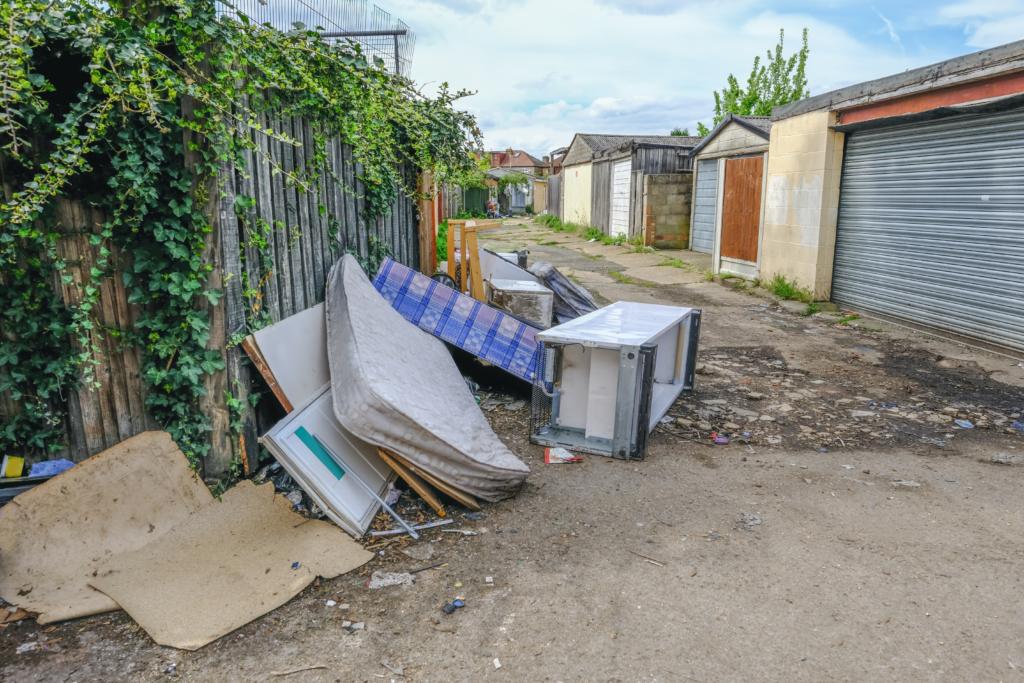
Despite the general push to be responsible for, and to minimise, our waste, we have noticed a steady increase in the number of landowners who have found themselves having to dispose of waste left by their tenants or waste that has been fly-tipped on their land by unknown third parties.
But why the increase? Some believe that the increase in landfill tax, together with tighter regulatory monitoring by the Environment Agency has made it more cost effective for those willing to break the law to dispose of waste unlawfully, rather than take it to an authorised site. Others say that things like few bin collections have aided the increase and that there is still, in some places, a culture of idleness and an attitude that someone else will clear up their waste.
Whatever the motivation, the illegal deposit of waste not only causes problems for wildlife and natural habitats, but it can create costly problems for land owners, particularly with larger estates that are more difficult to police.
The article provides an overview of the law in relation to private land, and a number of practical steps that can be taken to help minimise the risk of becoming a victim of someone else’s recklessness.
The Law
Landlord’s Liability
On private land, it is the responsibility of the landowner to remove the waste and dispose of it legally. If the landowner can identify the party responsible, it can claim the costs incurred (including reasonable removal, reinstatement and legal costs) from that party.
The key piece of legislation dealing with the deposit of waste is the Environmental Protection Act 1990 (EPA 1990) (“the Act”). Under section 33(1), it is illegal for any person to deposit controlled waste on any land unless in accordance with an environmental permit. Controlled waste includes household waste, industrial waste or commercial waste.
The obvious difficulty with the typical fly-tipper is identifying them and without evidence of their identity, the landowner is likely to be landed with the hassle and costs of removing the waste themselves. If they do not, they may be guilty of an offence.
But what about where the party is known to the landowner? Arising from the Act is the concept of the “knowing permitter”. Essentially, a landowner can be criminally liable as a “knowing permitter” of its tenant’s unlawful waste deposit on their land where they could reasonably be expected to notice the issue and simply failed to act.
Under section 59 of the Act the EA has the power to serve notice on the occupier to remove waste if it is deposited in breach of section 33(1). This notice can be served on the owner if the occupier cannot be traced. Again, it is an offence to fail to comply with such a notice.
A landowner may also be liable for their tenant’s nuisance if it is caused as a result of depositing waste, but generally only in limited circumstances where the nuisance is an inevitable consequence of granting the lease e.g. a lease for a waste transfer station.
However, the good news in all of this for Landowners is that generally speaking the tenant or licensee will usually be the primary target for any enforcement action by the Environment Agency. So, unless the tenant or licensee has limited means or is insolvent, or if the offender cannot be found, the Landlord is unlikely to be responsible for the clear-up.
Tenant/ Licensee Liability
Where a tenant or licensee has deposited waste unlawfully on its land, the landowner may have a cause of action against the tenant or licensee. That is usually in the form of claim for breach of contract or covenant and the lease or licence should be reviewed as soon as possible after the waste has been discovered.
Alternatively, the landowner may also or instead bring a claim in the Tort of Waste. This Tort concerns four different types of waste, namely:
- Ameliorating waste (changes the physical character of the property);
- Permissive waste (waste caused by omission);
- Voluntary waste (the wilful destruction or carrying away of something attached to the property);
- Equitable waste (acts of gross damage that cause harm to the reversionary interest in land that a prudent person would not cause).
If successful with a claim founded on the Tort of Waste, the possible remedies are damages and/or an injunction.
Practical Steps (some obvious ones!)
– make sure you have comprehensive provisions in respect of compliance with statue in your model lease and licences.
– If land has been used by a tenant, undertake a thorough review of the site as frequently as possible. Have they buried waste rather than disposing of it. Is there any disturbed soil? New features, i.e. fencing to screen what they have left behind?
– Actively manage and monitor your estate. If something doesn’t quite look right (recently disturbed vegetation etc.) investigate.
– If there are persistent issues, erect signage to dissuade people from tipping. Also consider surveillance. A dummy camera or a real CCTV system could assist.
– Do not move the waste from your Estate to the roadside or land outside of your ownership unless it is an authorised site able to receive the waste. To do that would amount to second act of fly-tipping, which again would be a criminal offence. There may also be a civil action for trespass by the Local Authority or other landowner.
– Keep any gates on roadside entrances closed and locked or use boulders to prevent any vehicles from parking there and depositing waste. The same with unused laybys and easily accessible verges.
– Consider whether you have insurance. Some insurers will provide cover for fly-tipping and look to speak with a specialist Insurance Broker. Most insurers will be willing to provide some level of cover, but the liability is, as you would expect, often capped. Clean up costs, if the waste is contaminated, can be a 6 figure sum.
– Consider reporting the offence to the police. This is not a 999 call, instead use the non emergency police number (101) to report the offence and get a crime number. Your insurer, if you have cover, is likely to ask for this and is likely to have expected you to have reported the issue promptly.
– If the worst does happen, be careful of contaminated waste and ensure everything is disposed of properly so as not to open yourself up to the risk of a prosecution by the EA.
– if in doubt, take professional advice.
